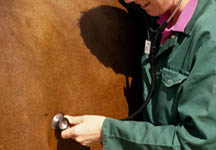Defra is reviewing regulations surrounding equine disease outbreaks after four horses contracted equine infectious anaemia (EIA or swamp fever) in the UK last year.
The department has identified 18 lessons to be learned from the outbreaks, including the setting up of a group comprising horse industry figures, to advise Defra and government agency Animal Health in the advent of a disease outbreak, as well as a review of post-import checks.
Two horses developed EIA in Wiltshire in January 2010, followed by two more horses in September at different ends of the country — one in Devon and one in Northumberland.
They had all been imported into the UK from Europe, one of them two years before.
Defra chief veterinary officer Nigel Gibbens said: “The September outbreaks of EIA showed how we can deal with incidents of the disease, but also that there is a real threat of the disease appearing in the UK.
“It is crucial for owners and vets to remain vigilant for signs of the disease and report any suspicions quickly.
“I am pleased that work with the new core group of equine stakeholders has very much improved the exchange of information between government and industry. But we can improve further and are now working on this.”
World Horse Welfare chief executive Roly Owers will sit on the equine core group. He said the report shows the UK is ill-prepared for an outbreak.
And disease expert Professor Josh Slater added: “It is easy to think of exotic disease as something that happens somewhere else, but we all have our part to play in the fight against equine diseases.”
This news story was first published in the current issue of Horse & Hound (21 April, 2011)



